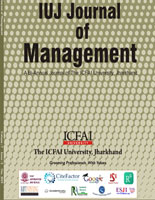(Dr. Veeramani G ,Ms. D.Hemalatha )
Keywords : Tribal, Scheduled Tribes, Constitution, intervention, Education, Capacity Building Skill Developments
EOI : eoi.citefactor.org/10.11224/IUJ.10.01.01



 The IUJ Journal of Management (IUJ-JOM) is the flagship journal of ICFAI University Jharkhand, Ranchi.
The aim of the journal is to provide insight into the business and management research. It also creates
a platform for the researchers, academicians, professors , practicing management professionals and proponents
in disseminating original,
The IUJ Journal of Management (IUJ-JOM) is the flagship journal of ICFAI University Jharkhand, Ranchi.
The aim of the journal is to provide insight into the business and management research. It also creates
a platform for the researchers, academicians, professors , practicing management professionals and proponents
in disseminating original,
theoretical and applied research in the field of management and allied disciplines. The Journal is a Bi-Annual, . . . . .Read more.
 Literature on Indian Tribes has become so extensive and proliferating that nearly each work
related to tribes requires a special prologue. Yet, there is a paucity of new ideas andinsights
into the way the tribal India works. In the absence of unified and universal notion of Tribals
among the states in India every state has taken to an easy recourse, the uncritical acceptance
of an administrative category, the
. . . .
Read more.
Literature on Indian Tribes has become so extensive and proliferating that nearly each work
related to tribes requires a special prologue. Yet, there is a paucity of new ideas andinsights
into the way the tribal India works. In the absence of unified and universal notion of Tribals
among the states in India every state has taken to an easy recourse, the uncritical acceptance
of an administrative category, the
. . . .
Read more.
 Hearing impairment is one of the most common disabilities. The problem relates to communication
and socialization challenges. Increase in human longevity would increase the cases of hearing loss in
elderly citizens. This impacts the overall personality of a person. People generally get demotivated
and introvert. In severe cases people develop suicidal tendencies and loose the interest to stay alive.
Read more.
Hearing impairment is one of the most common disabilities. The problem relates to communication
and socialization challenges. Increase in human longevity would increase the cases of hearing loss in
elderly citizens. This impacts the overall personality of a person. People generally get demotivated
and introvert. In severe cases people develop suicidal tendencies and loose the interest to stay alive.
Read more.
 The emergence of the crypto business has spawned an ecosystem of fintech start-ups that are
utilizing cutting-edge methods to reach out to new investors across borders. People are
flocking to this new-age, fast-emerging industry due to crypto curr
Despite the industry's frequent headwinds in the form of market instability, the lure of huge
returns and rapid money has drawn a large number of investors.
Read more.
The emergence of the crypto business has spawned an ecosystem of fintech start-ups that are
utilizing cutting-edge methods to reach out to new investors across borders. People are
flocking to this new-age, fast-emerging industry due to crypto curr
Despite the industry's frequent headwinds in the form of market instability, the lure of huge
returns and rapid money has drawn a large number of investors.
Read more.
Subscribe now to get notified about IU Jharkhand journal updates!
(Dr. Veeramani G ,Ms. D.Hemalatha )
Keywords : Tribal, Scheduled Tribes, Constitution, intervention, Education, Capacity Building Skill Developments
EOI : eoi.citefactor.org/10.11224/IUJ.10.01.01
( Anjan Niyogi ,Dr. Pallavi Kumari )
Keywords : hearing-aid use, older adults, accepted need, follow-up support, rehabilitation, hearing loss
EOI : eoi.citefactor.org/10.11224/IUJ.10.01.02
( Dr. Pritha Chaturvedi,Prof. Sumit Kumar Sinha )
Keywords : Financial Inclusion; Crypto Currency; Fintech; Distinct Asset Class.
EOI : eoi.citefactor.org/10.11224/IUJ.10.01.03
( Dr. Sanjiv Chaturvedi , FCS Pooja Shukla )
Keywords : Independent Director, Securities and Exchange Board of India, Corporate Governance, Promoters.
EOI : eoi.citefactor.org/10.11224/IUJ.10.01.04
(Rajbir Saha )
Keywords : Organized Retail, Liberalization, Customer satisfaction.
EOI : eoi.citefactor.org/10.11224/IUJ.10.01.05
( Dr. T. Tamilarasan )
Keywords : Theory, Theoretical Explanation Knowledge, Conceptual base and guide, Theoretical Content and Context, Research Conception and Conviction, Intellectual personality and Soul
EOI : eoi.citefactor.org/10.11224/IUJ.10.01.06
( Dr. Subrato Kumar Dey )
Keywords : Environmental Education, Pollution, Management, Biomass and Control
EOI : eoi.citefactor.org/10.11224/IUJ.10.01.07
( Ram Kishore Tripathi )
Keywords : HRM, appraisal management, personnel development, reward systems, employees , environmental strategies
EOI : eoi.citefactor.org/10.11224/IUJ.10.01.08
( Shakeel Ahmed )
Keywords : Covid-19, HDI, life expectancy, health policy
EOI : eoi.citefactor.org/10.11224/IUJ.10.01.09
( Maneka Perikkathara )
Keywords : Teamwork, Mindful workplace, productivity, performance, healthy environment.
EOI : eoi.citefactor.org/10.11224/IUJ.10.01.10
( Dr. Manish Kumar , Dr. Sweta Singh )
Keywords : cause-related marketing, Students, Consumer Behavior, Covid-19
EOI : eoi.citefactor.org/10.11224/IUJ.10.01.12
( K. Venkata Rami Reddy , Prof. A. Sree Ram )
Keywords : Banks, Equity Linked Savings Scheme (ELSS), Public Sector, Investors and Satisfaction level
EOI : eoi.citefactor.org/10.11224/IUJ.10.01.13
( Sebastián Laza, Marisela Cuevas, Col Prof Dr J Satpathy )
Keywords : Neuroeconomics, economic decision, epistemologists, economic theory, neoclassical
EOI : eoi.citefactor.org/10.11224/IUJ.10.01.14
